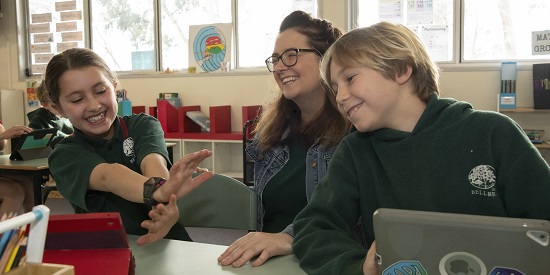New app helps kids learn how to keep their personal data safe online
Media release
A new educational app is helping kids protect their privacy online by showing what happens to the data they share on popular social media platforms.
The FriendSend app was designed in consultation with primary school students in Australia and internationally and aims to help young social media users navigate the challenges of developing a digital identity and managing personal data.
Project lead, Dr Luci Pangrazio, an Alfred Deakin Research Fellow in Deakin University's Centre for Research for Educational Impact (REDI) in the School of Education, enlisted the help of primary school students from Years 5 and 6 at Bellbrae Primary School, near Geelong, to develop the app and ensure its functionality.
"The students helped us design and name the app. They also took part in the trial and feedback stage, together with primary school students from the Escuela Primaria Urbana in Uruguay," Dr Pangrazio said.
"Young people generate large amounts of personal data through their use of social media and we need them to better understand the risks and opportunities associated with social media use.
"Personal data is now routinely used to profile and predict behaviour with the implications shaping young people's social and educational futures and, potentially, life-long spending and lifestyle behaviours.
"A critical understanding of social media requires an understanding of the 'back end' – or infrastructure of digital technology - particularly the way personal data, algorithms and automation mediate interactions and the circulation of content."
Dr Pangrazio said most schools tended to focus on teaching cybersafety and promoting risk-averse behaviours.
"Given the increasing importance of digital media in all aspects of life and the complex, commercial orientation of much mainstream media including social media, cybersafety alone is not enough," Dr Pangrazio said.
FriendSend works by aggregating data such as chat, images and geolocations generated through social media sites and processes it using commercial data mining techniques and tools.
This personal data collection and processing is normally hidden from users but the FriendSend app allows these processes to be visible to teachers and students.
With support from teachers, students create a profile and use the app for one to two weeks, generating personal data through the chat app before chat, image and geolocational data are aggregated and processed using Google APIs.
Use of the app is complemented by three workshops that develop understandings of social media, digital identities and personal data, as well as how to manage and protect privacy online.
Teachers can also prompt discussion or activities through a 'send all' function.
For example, one activity is the 'selfie challenge'. Students are asked to take a photo of themselves capturing a particular emotion (i.e. joy, anger) that could be detected by the Google APIs.
The student/group with the highest reading for the designated emotion on the web app wins the challenge. Aside from these prompts, teachers tend to observe and support student’s use rather than chatting with them directly
"Teachers and students found it really beneficial to see personal data processing and the implications of this," Dr Pangrazio said.
"It also provided a safe and supportive space from which young people can explore social media."
FriendSend is part of the Data Smart Kids program, which was developed in collaboration with Universidad ORT (Uruguay) and was funded by Agencia Nacional de Investigacion e Innovacion (ANII), Uruguay.
Both FriendSend and the Teacher Guide and Powerpoint are freely available and can be accessed here: https://en.datasmartkids.com
To download and use FriendSend teachers will need to contact the researchers through the attached link to get a school code.

